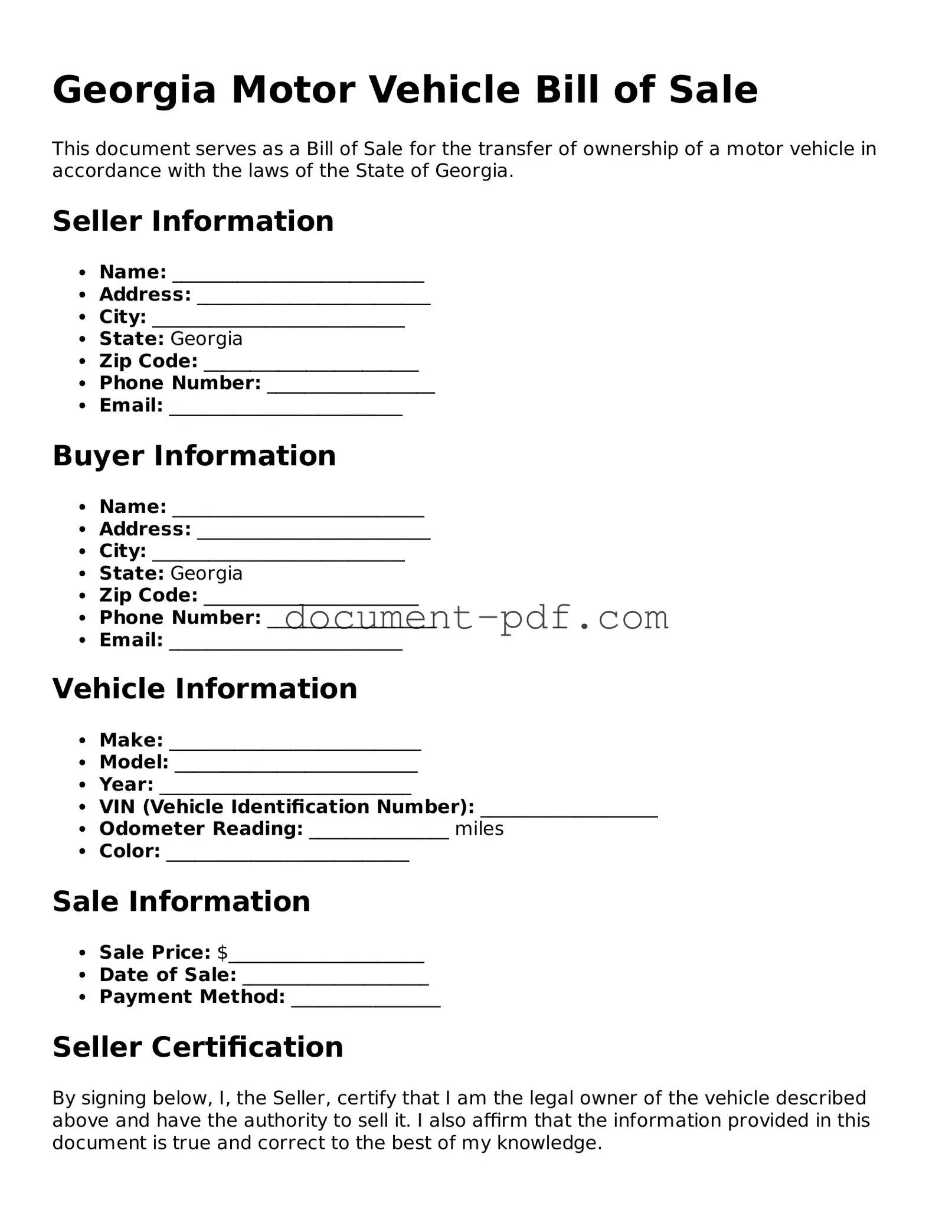The Georgia Motor Vehicle Bill of Sale is similar to the general Bill of Sale, which is a document used to transfer ownership of personal property. Like the motor vehicle version, a general Bill of Sale includes details about the buyer and seller, a description of the item being sold, and the sale price. This document serves as proof of the transaction and can be important for tax purposes and for establishing ownership. Both documents require signatures from the involved parties to validate the agreement.
Another document that shares similarities is the Vehicle Title. The Vehicle Title is an official document issued by the state that certifies ownership of a vehicle. While the Bill of Sale records the transaction, the Vehicle Title is essential for registering the vehicle with the state. Both documents contain information about the vehicle, such as its make, model, and Vehicle Identification Number (VIN), and require the seller's signature to transfer ownership legally.
The Odometer Disclosure Statement is also comparable. This form is required when selling a vehicle to disclose the mileage at the time of sale. Like the Motor Vehicle Bill of Sale, it aims to protect both the buyer and seller by providing an accurate account of the vehicle's condition. This document must be signed by both parties and is often included as part of the Bill of Sale in many states, ensuring transparency in the transaction.
The Affidavit of Heirship is another document that may be relevant in certain situations, particularly when a vehicle is inherited. This affidavit serves to confirm the relationship between the deceased and the heir, allowing the heir to transfer the vehicle’s ownership without a formal probate process. Like the Motor Vehicle Bill of Sale, it requires signatures and serves as a legal record of ownership transfer.
The Warranty Deed is similar in that it is used to convey ownership, but it applies to real estate rather than vehicles. Both documents require the seller to affirm their ownership and the buyer to accept the property. While the Bill of Sale is specific to personal property transactions, the Warranty Deed includes warranties that protect the buyer from future claims against the property.
For those interested in securing their rental agreements, a comprehensive guide on the Georgia Lease Agreement is available. This document is crucial for detailing the responsibilities between landlords and tenants, ensuring that both parties are clear on their commitments. To learn more, visit this essential resource on Lease Agreement terms.
The Purchase Agreement is another document that serves a similar purpose. This agreement outlines the terms of the sale, including price, payment method, and any conditions that must be met before the sale is finalized. Like the Motor Vehicle Bill of Sale, it protects both parties by clearly stating the expectations and obligations involved in the transaction.
The Release of Liability form is also relevant. This document is used to inform the state that the seller is no longer responsible for the vehicle after the sale. It protects the seller from any future liabilities associated with the vehicle. While the Bill of Sale confirms the transfer of ownership, the Release of Liability ensures that the seller's responsibilities end with the sale.
The Power of Attorney document can come into play when someone is unable to sign the Bill of Sale in person. This legal document allows another person to act on behalf of the seller. Both documents require proper identification and signatures, ensuring that the transaction is legitimate and binding.
Lastly, the Insurance Certificate is relevant to vehicle transactions. While it does not directly transfer ownership, it provides proof of insurance coverage for the vehicle. Similar to the Motor Vehicle Bill of Sale, it includes details about the vehicle and the owner, ensuring that the buyer has the necessary coverage upon taking ownership.

